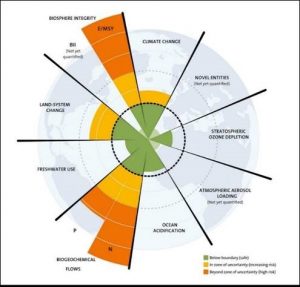Breaching planetary boundaries
In 2009, Johan Rockström of the Stockholm Resilience Centre led a group of internationally renowned scientists to identify the nine processes that regulate the stability and resilience of the Earth system. The scientists proposed quantitative planetary boundaries within which humanity can continue to develop and thrive for generations to come.
Crossing these boundaries increases the risk of generating large-scale abrupt or irreversible environmental changes. The body of academic evidence continues to show that as unsustainable human development continues unabated, and as the climate change threat grows, two of nine planetary boundaries – the integrity of the biosphere and biogeochemical flows – have already been breached.

The breaching of boundaries threatens all life on Earth. Source: ‘Planetary boundaries: Guiding human development on a changing planet’.
A natural world in crisis
“The natural world is in crisis: never in human history has biodiversity declined as fast as it is doing so today,” says Aaron Vermeulen, Director Green Finance, WWF-NL. “Human pressures on nature are putting a staggering one million species at risk of extinction, many within only a few decades. Changes in land and water use, the direct exploitation of organisms, pollution and the introduction of invasive species threaten many ecosystems.”
“However, the nature crisis is not a standalone issue. Climate change is further exacerbating the drivers of nature loss, which in turn reduces our ability to sequester carbon and thereby mitigate climate change. This negative feedback loop also reduces our ability to withstand the impacts of climate change, since degraded ecosystems do not protect us as well against natural events as healthy ecosystems.”
“Robeco’s internal biodiversity roadmap, captured in this white paper, is a real step forward. It aims to understand and address nature-related impacts and dependencies across its organization. We look forward to collaborating with Robeco to ensure robust implementation.”
Greater collaboration
Such collaboration is fundamental to being able to create the data and tools needed to progress. Robeco is among the first signatories of the Task Force for Nature-Related Disclosure (TNFD), founded by the WWF and others. It aims to build a framework which will allow financial institutions to incorporate nature-related risks and opportunities into strategic planning, risk management and asset allocation decisions.
Robeco signed the Finance for Biodiversity Pledge in 2020, committing to protect and restore biodiversity through finance activities and investments by 2024.
“Our general aim is that within the next few years we will be able to measure and steer on our contribution as an investor to the protection of biodiversity and nature in partnership with WWF-NL and other collaborations such as the Finance for Biodiversity Pledge,” says Van der Werf.
“In this positioning paper we describe our journey – why we started it, what we have been doing, and where we aim to be. We hope you will enjoy reading it, and then join us on this vital mission.”






![[uns] house of commons, parliament](https://ifamagazine.com/wp-content/uploads/wordpress-popular-posts/788873-featured-300x200.webp)


![[UNS] tax](https://ifamagazine.com/wp-content/uploads/wordpress-popular-posts/788955-featured-300x200.webp)




